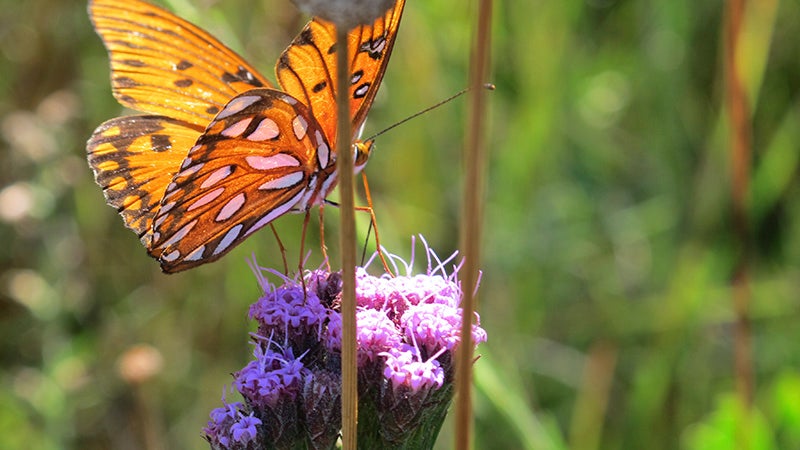Fall native plant sale
Published 7:00 am Wednesday, October 23, 2019

- Gulf fritillary butterflies can be found this time of the year in the Savanna Exhibit of the Crosby Arboretum. Submitted photo
By Patricia R. Drackett
Director, The Crosby Arboretum, Mississippi State University
Assistant Extension Professor of Landscape Architecture
This Friday and Saturday, visit the Crosby Arboretum for the big Fall Native Plant Sale! The sale takes place October 25 and 26, from 10 a.m. to 3 p.m. each day. Members are allowed to enter the sale one hour earlier each day.
While you are at the Arboretum, feel free to take a stroll through our exhibits. In the Savanna Exhibit, you will notice one species in particular taking the stage, the golden-hued swamp sunflower (Helianthus angustifolius).
An interesting characteristic of swamp sunflower is its very rough textured leaves, which feel just like a cat’s tongue!
You may have spotted clusters of this native perennial at the base of slopes along local roadsides. Low areas that collect water give this carefree native perennial the conditions it favors.
If you would rather spend more time looking at your garden than laboring in it, swamp sunflower just might be the perfect perennial choice, as this native species performs superbly in a typical garden bed.
Look for sunny areas of your yard that stay consistently moist to offer the cultural conditions preferred by swamp sunflower. Although the plant will grow in shadier areas, it will be a bit floppier and require some staking.
Swamp sunflower is deer-resistant and salt tolerant, in addition to being absolutely gorgeous. Cultivars of the plant with different shades of gold or yellow are available in the nursery trade, such as ‘Mellow Yellow’, ‘First Light’, and ‘Gold Lace’. Some of the cultivars are said to be better suited to drier soils.
Because it grows to four or five feet, swamp sunflower is best located in the back of your perennial bed. The flowers will be attractive next to shades of red, purple, or blue, which offer a nice color contrast. Grasses also provide a nice textural contrast with the flat-topped blooms.
Helianthus angustifolius is of special value to native bees, and attractive to birds. A member of the Aster family (Asteraceae), also known as the sunflower family, it is related to other tough species grown for their blooms such as zinna, dahlia, and cosmos. Edible members of the Aster family include lettuce, sunflowers, and artichokes.
You will also see the purple flower clusters of deer’s tongue (Carphephorus odoratissimus) in the Savanna Exhibit. This plant is also in the Aster family, and abundant in the southern portion of the Arboretum, near the Pitcher Plant Bog.
Deer’s tongue is also called vanilla plant, or vanillaleaf. After European settlement, an industry sprung up that depended on collecting this species to use as a flavoring in pipe tobacco. As the leaves wilt and are crushed, they release a vanilla-like odor.
Vanilla plant doesn’t like areas quite as wet as the pitcher plant bog and occurs on the drier side of the pathway across from the bog.
The perennial grows in full sun to part shade and naturally occurs in wet flatwoods, growing to three feet or more. It will perform well in average moisture and typical garden soil, and is attractive to bees, birds, and butterflies.
Carphephorus odoratissimus must have earned one of its common names from the shape of its leaves, which resemble a deer’s tongue. An evergreen rosette of leaves is present in the winter months.
Our Fall Native Plant Sale will include traditional native trees and shrubs as well as blooming perennials for your pollinator and butterfly garden.
Sign up for our wire-wrapped jewelry workshop to be held Saturday, November 2 from 9:00 a.m. to 12:30 p.m. with jewelry maker Connie Boyd of Unique Stones. Program cost of $70 includes chain, tools for use, silver wire, semi-previous stone and lesson, paid directly to the instructor on the day of the workshop by cash or check. Limit of 10 persons. Reservations are required.
A yoga class will take place on the Pinecote Pavilion Saturday, November 2, from 1:00 to 2:30 p.m. with certified yoga instructor James Sones. Reservations are requested. Members $2, non-members $5. Join us for the 17th Annual Piney Woods Heritage Festival on Saturday, November 16, from 10:00 to 3:00 p.m.
Stop in to see the Arboretum’s fall gallery exhibit, photography by Jenny Bibb Ryals. To sign up for programs, call 601-799-2311.
For more information, please see our Facebook page or the calendar on our website at https://crosbyarboretum.msstate.edu.
The Crosby Arboretum is located at 370 Ridge Road in Picayune, at I-59 Exit 4, and open Wednesday through Sunday from 9:00 to 4:30. Leashed pets are always welcome!



